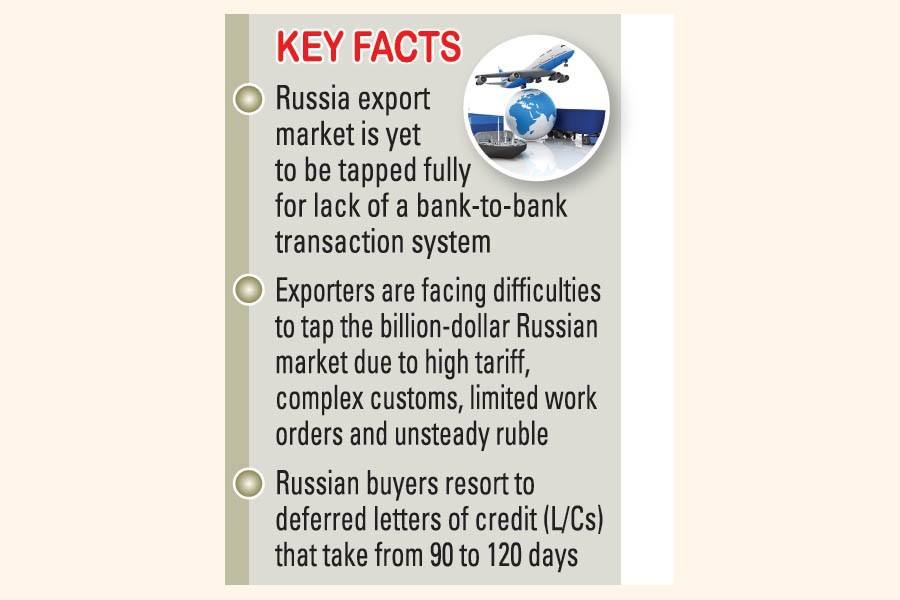Country's banks are reluctant to establish direct transaction links with the Russian banks amid the fear of possible US sanction, officials said.
The fear was expressed in a position paper prepared by the Bangladesh Bank (BB) on the proposed direct banking operations with Russia.
"Local banks fear that directly embracing the Russian System for Transfer of Financial Messages (SPFS) platform in Bangladesh in place of SWIFT may result in retaliatory US sanctions and losing US-based correspondent banking and international payment settlement facilities. The de-risking criteria imposed by US-based counterpart/correspondent banks treats any kind of alignment with SPFS may be considered as a bypassing mechanism," reads the paper.
The central bank suggested settling bilateral payments/transactions with Russia through the foreign banks operating there in the event of failure to make direct transactions with Russia.
It was also mentioned that if a particular Bangladeshi bank directly gets into SPFS, an alternative to the US-backed SWIFT network of financial transactions, the bank itself and even the total financial intermediation industry of the country may come under scrutiny by the US bloc.
Considering risk, the central bank requested the government to take a decision in this regard.
In response, the Economic Relations Division (ERD) has notified that BB can take a decision subject to holding discussions with the scheduled banks.
The BB presented the issue in an interbank meeting held on February 25, 2020 in presence of representatives from the ministries of foreign affairs and commerce, and the ERD.
In the meeting, necessary discussions with the banks were held and thus the proposed move to establish any banking transaction mechanism was stopped, said a BB source.
The BB suggested holding further discussion between itself and the Bank of Russia under the Bangladesh-Russia Intergovernmental Commission on Trade, Economic, Scientific, and Technical Cooperation (BR-IGC) framework to devise an alternative trade payment settlement system and sent.
Meanwhile, the BR-IGC signed two protocols in its meetings held on October 24, 2018 and on November 14, 2019 to address the barriers to unconstrained banking relationship between the two countries.
In accordance with the first protocol, an interbank platform in Bangladesh has been formed to discuss the pertinent banking issues.
Ministerial representations have also been accommodated in the platform in the status of 'observers'. Till date, the platform held two meetings on July 7, 2019 and another on January 14, 2020.
Prior to the meetings, the Bangladesh side presented an alternative trade payment settlement framework while visiting Bank of Russia (BOR), Moscow on September 24, 2018.
The framework was intended to evade the involvement of USD in the bilateral transactions, and was sent to the Russian side on April 09, 2019.
A Bangladesh Bank team also visited BOR on October 21, 2019 and discussed all pertinent issues including both sides' proposals again.
The two sides also discussed the issue of initiating the 'Inter regional transaction' system with the partner banks and using local currencies in transaction settlement as Russia already had such measures in place with India, China, Vietnam, and some other countries, mentioned the position paper.
Later, the BOR proposed to include some financial institutions of Bangladesh in their own Financial Messaging System (SPFS).
This was further emphasized by the Russian side during the Moscow visit of the Bangladesh side in October 2019 and in the second IGC meeting held in Bangladesh during 12-14 November 2019.
The Russian side is also continuously pressing for inclusion of Bangladeshi financial institutions in SPFS throughout their correspondence with the BB.
However, Article-6(3) of second BR-IGC Protocol states that "The sides agreed to extend support towards using convenient and agreed-upon financial messaging system(s) for establishing secured communication between financial institutions of the Russian Federation and the People's Republic of Bangladesh". Thus, joining the SPFS platform is not obligatory for Bangladesh.
According to the BB, the SPFS provides financial messaging service only. For this, the user banks need otherwise vehicle for the value/currency for final settlement. The settlement process has not been clearly articulated in the Russian proposal.
No representation from the BOR in the last two BR-IGC meetings has provided very little scope to discuss these pertinent technical issues, said the BB paper.
On the other hand, a framework for alternative payment settlement has been proposed by Bangladesh to address the issues in both the messaging mechanism and the payment settlement.
"Russia is a potential export market, but it's yet to be tapped fully for lack of a bank-to-bank transaction system," a high official of the commerce ministry said.
The main purpose is to establish a banking transaction system between the two countries, he told the FE.
Local businesses have to depend on a third party to ink a deal. In some cases, they do business through telegraphic transaction, the official explained.
The country's exporters are facing difficulties to tap the billion-dollar Russian market due to high tariff, complex customs, limited work orders and unsteady Russian currency ruble, according to industry insiders.
Russian buyers resort to deferred letters of credit (L/Cs) that take from 90 to 120 days which, many say, is also an obstacle to export growth.
When contacted, a senior official of commerce ministry with good knowledge of the issue said: "We had sent a letter to the Russian Federation through diplomatic channel to make a way out in this regard. But, we are yet to get any response."
He, however, said: "We again have given a reminder to establish banking transaction system between the two countries."
Export of Bangladeshi products to Russia has increased manifold during the last nine years. The country exported goods worth US$ 487 million to Russia in the fiscal year 2019-20.


